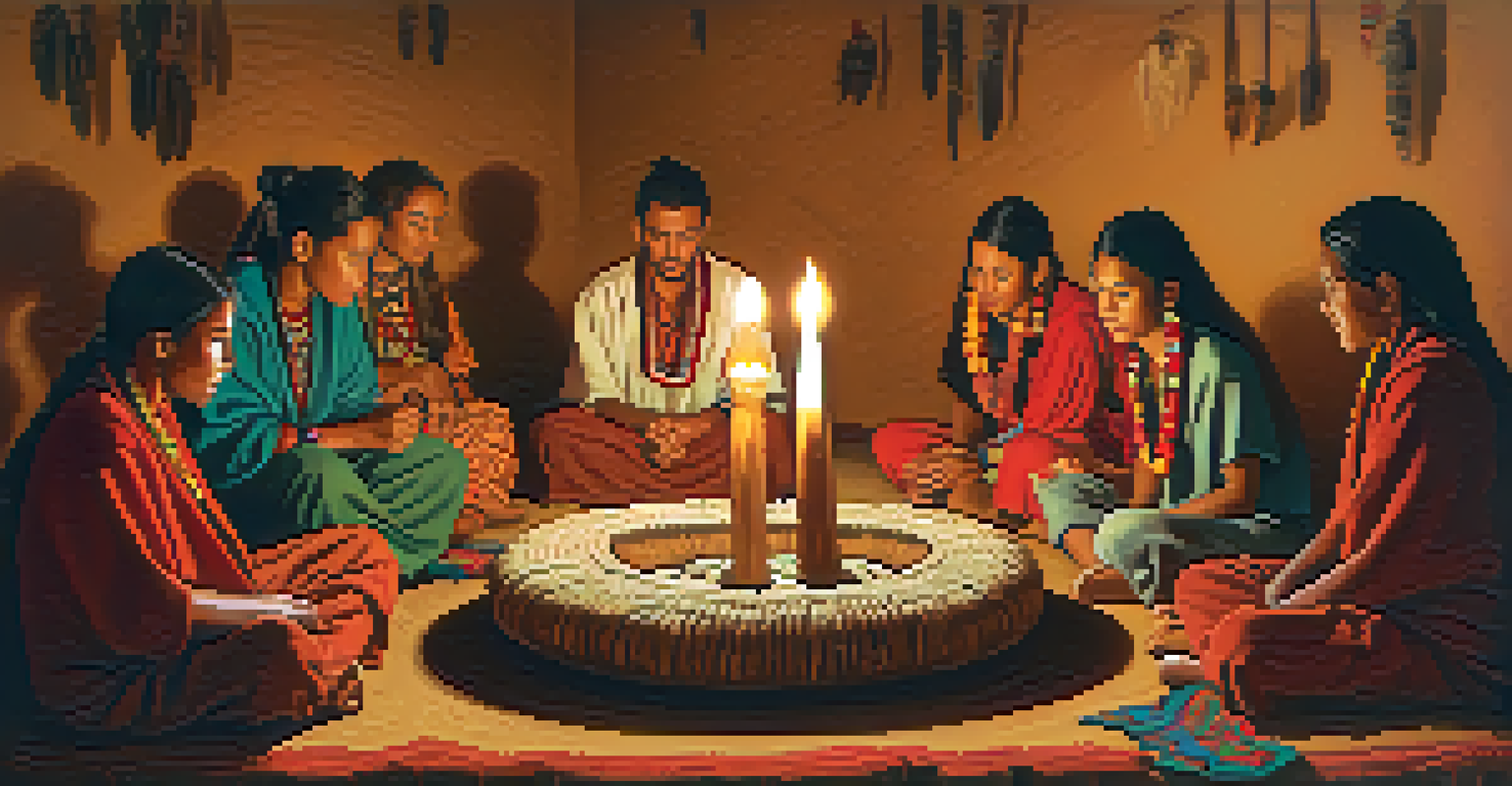The Role of Peyote in Modern Addiction Recovery Programs

Understanding Peyote and Its Cultural Significance
Peyote is a small, spineless cactus native to Mexico and the southwestern United States, known for its psychoactive properties. Traditionally, it has been used in Native American spiritual practices for centuries, fostering a deep connection to cultural identity and healing. Beyond its mystical allure, Peyote contains mescaline, a compound that alters perception and can lead to profound insights.
Psychedelics can help us understand ourselves better, and that understanding can lead to healing.
In many indigenous cultures, Peyote ceremonies are integral to communal healing and personal introspection. These rituals often provide participants with a sense of purpose and belonging, which can be particularly beneficial for individuals facing addiction. The communal aspect of using Peyote allows for shared experiences that can strengthen social bonds and foster emotional support.
As modern society grapples with addiction's complexities, there is a growing interest in how traditional practices, including Peyote use, can inform contemporary recovery methods. This intersection of ancient wisdom and modern psychology presents a fascinating opportunity to explore alternative pathways to healing.
The Science Behind Peyote and Addiction Recovery
Research on Peyote and its active compound, mescaline, indicates that these substances may have therapeutic effects on mental health, particularly in addiction recovery. Mescaline interacts with serotonin receptors in the brain, which can lead to altered states of consciousness and intense emotional experiences. These experiences can often result in a reevaluation of one’s life choices and behaviors.

Furthermore, studies suggest that psychedelic experiences can foster a sense of interconnectedness, which may help individuals feel less isolated in their struggles with addiction. By promoting feelings of empathy and understanding, Peyote may help individuals confront the underlying emotional issues that contribute to their addiction.
Peyote's Cultural Healing Role
Peyote has been used for centuries in Native American spiritual practices, promoting communal healing and personal introspection.
It's important to note that while Peyote shows promise, it is not a panacea. Like any treatment, it should be approached with caution and under professional guidance, especially considering the legal and ethical implications surrounding its use.
Integrating Peyote into Modern Treatment Programs
Integrating Peyote into addiction recovery programs requires a thoughtful approach that respects both its cultural roots and modern therapeutic practices. Some programs are beginning to incorporate guided Peyote ceremonies, facilitated by trained professionals who understand both the spiritual and psychological aspects of the experience. This integration can create a safe space for individuals to explore their emotions and confront their addiction.
The healing journey is not just about the individual; it's about the community that supports them.
While some recovery programs prioritize conventional methods like counseling and medication, incorporating Peyote can provide an alternative pathway for those who resonate with its cultural significance. It encourages a holistic view of recovery that encompasses emotional, spiritual, and psychological healing, offering a broader toolkit for individuals seeking to overcome addiction.
However, it's crucial to ensure that these programs are designed ethically and with respect for indigenous traditions. Collaboration with Native American leaders and healers can help ensure that the use of Peyote is both respectful and beneficial.
Personal Stories: Transformative Healing Through Peyote
Many individuals have shared transformative stories about their experiences with Peyote in the context of addiction recovery. For some, the journey begins with a deep sense of despair and isolation, only to be profoundly altered by a Peyote ceremony that opens them to new perspectives. These personal anecdotes often highlight the powerful emotional shifts that can occur during and after the experience.
Participants frequently report feelings of clarity and insight, allowing them to confront past traumas and understand their addiction in a new light. The shared experience of the ceremony can also strengthen bonds with others, creating a supportive community that can be invaluable in the recovery process.
Therapeutic Potential of Mescaline
Research indicates that mescaline, found in Peyote, may aid in addiction recovery by fostering emotional insights and interconnectedness.
These stories not only underscore the potential of Peyote in healing but also emphasize the importance of community and shared experience in overcoming addiction. They serve as a reminder that recovery is often a deeply personal and communal journey.
Challenges and Considerations in Peyote Use
Despite its potential benefits, there are challenges and considerations when it comes to using Peyote in addiction recovery. One significant challenge is the legal status of Peyote, which varies by region and can hinder its accessibility for those seeking help. Many recovery programs must navigate complex legal landscapes to provide safe and legal access to Peyote.
Additionally, not everyone may respond positively to psychedelic experiences. For some, Peyote can trigger feelings of anxiety or paranoia, especially in individuals with certain mental health conditions. It is essential for recovery programs to screen participants thoroughly and provide appropriate support during and after the experience.
Ultimately, while Peyote offers a unique approach to healing, it is vital to balance its use with traditional therapeutic methods. A comprehensive recovery plan that considers the individual's needs and circumstances can create the best outcomes.
The Future of Peyote in Addiction Recovery
As society continues to explore alternative therapies for addiction, Peyote's role in recovery is likely to evolve. The increasing acceptance of psychedelics in therapeutic settings has sparked conversations on how traditional substances like Peyote can complement modern treatment approaches. This shift may lead to more research and clinical trials focused on its efficacy in addiction recovery.
Moreover, a growing number of mental health professionals are advocating for the integration of indigenous healing practices into mainstream treatment. This could pave the way for more inclusive recovery programs that honor cultural traditions while addressing contemporary needs.
Integrating Traditional Practices
Ethically incorporating Peyote into modern treatment programs can create a holistic approach to addiction recovery, respecting cultural traditions.
The future of Peyote in addiction recovery is not just about the substance itself but also about fostering a greater understanding and respect for the cultures that have used it for centuries. By bridging the gap between traditional practices and modern science, we can create a more holistic approach to healing.
Conclusion: Embracing Diverse Paths to Recovery
In conclusion, the role of Peyote in modern addiction recovery programs highlights the importance of embracing diverse healing paths. While traditional methods remain crucial, integrating alternative approaches can offer individuals a richer tapestry of support. Peyote, with its deep cultural roots and potential therapeutic benefits, represents just one of many tools available for those seeking recovery.
Understanding and respecting the cultural significance of Peyote is essential as we navigate its use in contemporary contexts. By prioritizing ethical considerations and promoting collaborative practices, we can honor the traditions that have informed our understanding of healing.

Ultimately, the journey to recovery is personal and unique for each individual. By fostering an environment that values diverse perspectives and practices, we can help pave the way for more inclusive and effective addiction recovery strategies.